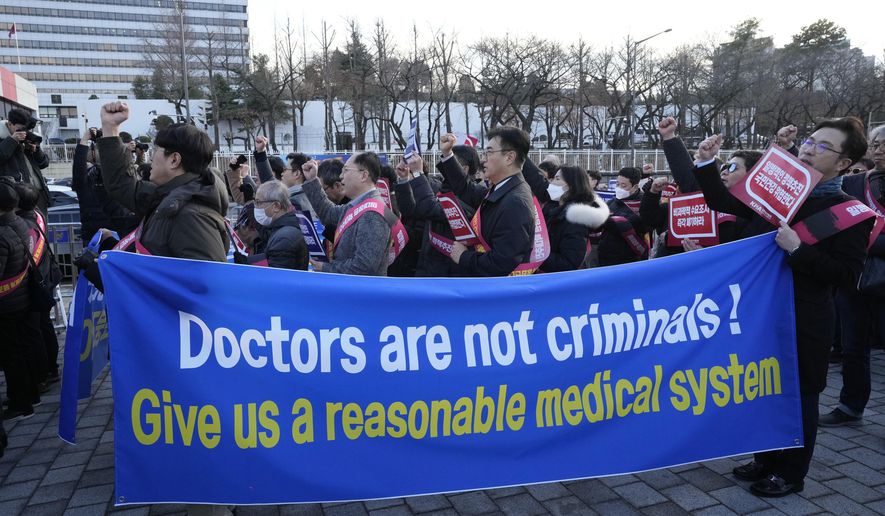 Doctors stage a rally against the government’s medical policy near the presidential office in Seoul, South Korea, on Feb. 25, 2024. Desperate to end a weekslong strike by thousands of doctors, South Korea’s government said Friday it will slow down … more >
Doctors stage a rally against the government’s medical policy near the presidential office in Seoul, South Korea, on Feb. 25, 2024. Desperate to end a weekslong strike by thousands of doctors, South Korea’s government said Friday it will slow down … more >By Kim Tong-hyung - Associated Press - Friday, April 19, 2024
SEOUL, South Korea (AP) — Desperate to end a weekslong strike by thousands of doctors, South Korea’s government said Friday it will slow down a plan to admit more students to the country’s medical schools from next year.
More than 90% of the country’s 13,000 medical interns and residents have been on strike since late February, when the government announced a plan to recruit 2,000 more students next year. That would have increased the current cap of 3,058, which has been the same since 2006, by about two-thirds.
The government adopted a compromise proposal put forward by the presidents of six state-run universities on Thursday, under which medical schools will increase admissions over several years.
Doctors’ groups have claimed that the universities would be unable to handle a steep increase in students and that it would undermine the quality of the country’s medical services. Government officials say the country significantly needs more doctors to cope with the country’s fast-aging population.
Announcing the compromise proposal, Prime Minister Han Duck-soo cited concerns that the prolonged strike by junior doctors is increasing the strain on hospitals.
Han said the country’s 32 medical schools will be allowed to lower their quotas for new places by up to 50% of the target set by the government in 2025, meaning the number of new places could end up closer to 1,000 than 2,000.
Officials stressed that the compromise is temporary and that the schools will be required to finalize plans by April to increase their admissions by the full 2,000 by 2026.
Doctors’ groups have called for the government to scrap the plan entirely.
“The government decided that the damage caused by the vacuums in healthcare services cannot be left unchecked and that bold decisions are needed, considering the demands by patients and broader public to solve the problem,” Han said in a news conference, urging the striking doctors to return to work and negotiate with the government.
Copyright © 2024 The Washington Times, LLC.
No comments:
Post a Comment